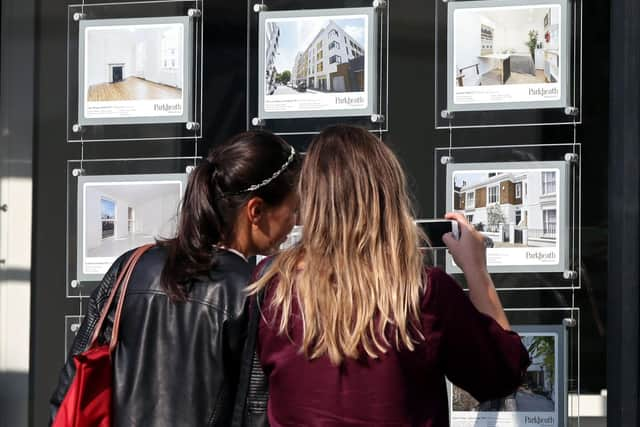Property prices: Average cost of a home in Northern Ireland falls by 0.3% with nearly £1,000 month-on-month decline in values across the UK
and live on Freeview channel 276
That figure was also the average property value decline across the nation as a whole, marking the fourth monthly decline in a row, Halifax said.
House prices dropped by 2.4% on an annual basis, easing from a 2.6% fall in June.
Advertisement
Hide AdAdvertisement
Hide AdThe typical UK home cost £285,044 in July, down from a peak of £293,992 last August.


In June this year, the average UK property value was nearly £1,000 higher than in July, at £286,011.
The average house price in Northern Ireland is now £185,322.
Kim Kinnaird, director, Halifax Mortgages, said: "Average UK house prices edged down slightly in July, with the monthly fall of 0.3% equivalent to a drop of around £1,000 in cash terms. While this was the fourth consecutive monthly decrease, all have been smaller than (minus) 0.5%.
Advertisement
Hide AdAdvertisement
Hide Ad"In reality, prices are little changed over the last six months, with the typical property now costing £285,044, compared to £285,660 in February."
She added: "In particular, we're seeing activity amongst first-time buyers hold up relatively well, with indications some are now searching for smaller homes, to offset higher borrowing costs.
"Conversely the buy-to-let sector appears to be under some pressure, though elevated interest rates are just one factor impacting landlords' business models, together with considerations of future rental market reforms. It remains to be seen how many may choose to exit and what that could mean for the supply of properties available to buy.
"Prospects for the UK housing market remain closely linked to the performance of the wider economy. Several factors are providing support, notably strong wage growth, running at around 7% annually. And, while the uptick in unemployment is likely to restrain that somewhat, it seems unlikely to reach levels that would trigger a sharp deterioration in conditions.
Advertisement
Hide AdAdvertisement
Hide Ad"Expectations of further base rate increases from the Bank of England were tempered by a better-than-expected inflation report for June. However, while there have been recent signs of borrowing costs stabilising or even falling, they will likely remain much higher than homeowners have become used to over the last decade.
"The continued affordability squeeze will mean constrained market activity persists, and we expect house prices to continue to fall into next year. Based on our current economic assumptions, we anticipate that being a gradual rather than a precipitous decline. And one that is unlikely to fully reverse the house price growth recorded over recent years, with average property prices still some £45,000 (19%) above pre-Covid levels."
Tom Bill, head of UK residential research at Knight Frank, said: "While we expect UK prices to fall by 5% in 2023, demand should prove more resilient than expected given the shock-absorber effect of strong wage growth, lockdown savings, the availability of longer mortgage terms, forbearance from lenders and the popularity of fixed-rate deals in recent years."
Some property professionals said housing market activity is holding up among first-time buyers in particular.